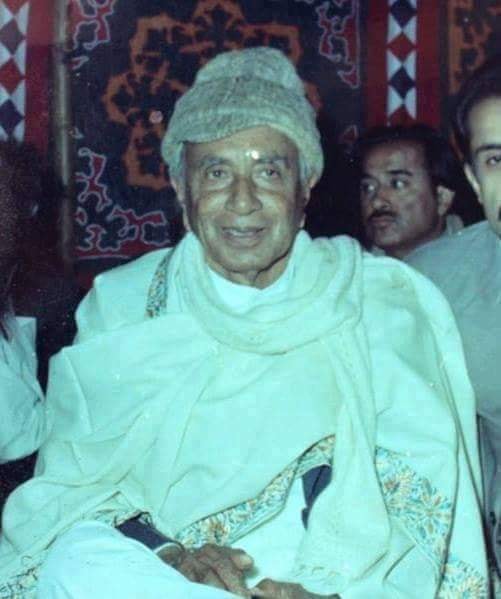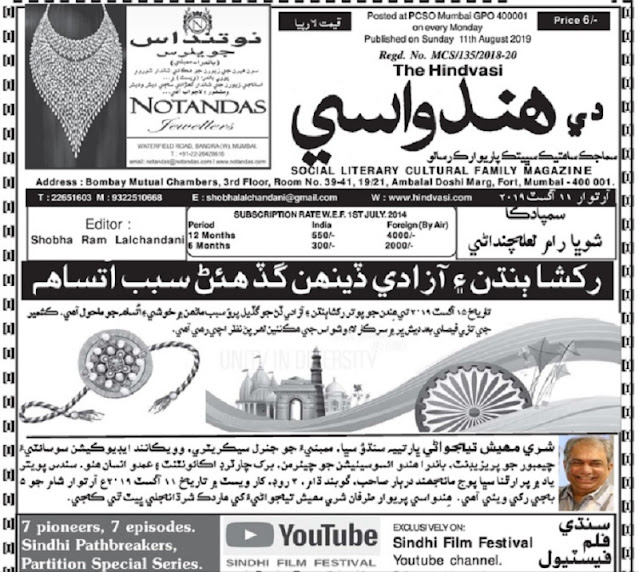G.M Sayed : A visionary Leader
By: Mohammad Ibrahim Joyo
Among Opposition leaders in Pakistan, Mr. G.M. Sayed has remained the longest period under detention after independence more then 30 years.He has passed almost every second day of his life in Pakistan in jail or under house arrest. Why is it so? Is this man that much dangerous to the country and the people (or, for that matter, the peoples) of Pakistan? What does he want? What are his beliefs? What does he say?
G.M. Sayed is also the one political leader in our midst, who has written the largest number of books unfortunately mostly in his mother tongue, Sindhi. He has produced some 45 books todate on more than one subject, ranging from mostly politics to pure literature. His thoughts and sentiments are, therefore, no secret, and he himself never concealed them any time and anywhere in jail or outside, before courts of law or in public meetings, hostile or friendly.
Sayed Sahib has had differences with the leaders and rulers of Pakistan and their religio-political ideologies almost from the start. His disagreements with them have never been personal, contentious or superciliary. They have always been on principles, dignified and most deeply felt.
Firstly, Sayed Sahib does not subscribe to the view that Muslims (or for that matter, Indo-Pak Muslims, or even Pak-Muslims) are a nation in the sense in which the term nation is universally used in the present times. According to him, Pakistani people, or peoples, irrespective of their religious persuasions, are, or can become, a nation. In this he relies for support, among other considerations, on the historic declaration made by Quaid-e-Azam, the Founder of Pakistan, in his inaugural address to the Constituent Assembly of Pakistan on 11th August, 1947, to the effect that Muslims, in time, will cease to be Muslims in Pakistan, and Hindus will cease to be Hindus not from religious view-point but politically, etc., etc., thereby affirming most positively the great truth of modern times that Nation-hood or Nationality was a territorial concept, and not an ideological one, and that with the birth of Pakistan, a nation was born, which could and must willy-nilly call itself Pakistani nation, and should exert itself to live and behave as a nation.
Secondly, Sayed Sahib has never agreed with the ruling circles in Pakistan in their totalitarian methods to achieve integration of the peoples in Pakistan to form a nation, since through these methods, quite the opposite results ensue, and such peoples and such a country, instead of uniting, split up and disintegrate. On his part, he always stood most zealously for securing spontaneous and willing consent of different peoples in Pakistan to come nearer each other and live together in freely agreed arrangement of mutual acceptance and justice and thus build themselves into an irrevocable nation in due course.
Thirdly, Sayed Sahib has always stood very strongly against priest-hood among Muslims. Islam has forbidden priest-hood totally. Yet priest-hood of the worst type has broken through and entrenched itself in Muslim Society for centuries past. Muslim priest-hood, like any other priest-hood, has always played the part of unabashed and insatiate sycophants of power and privilege in Society.
Muslim priest-hood like any other priest-hood, stands most doggedly in the path of enlightenment and material progress of people in Pakistan. Whereas almost all priest-hood in the world by now has either disappeared or has been forced to confine itself within its own limits of religious position, Muslim priest-hood in Pakistan, on the contrary, has gained dis-proportionate and highly inflated status particularly in its political life. Muslim priest-hood in Pakistan has, therefore, to be curbed and forced to live and function within limits, in order that the country is saved from the ravages of its cantankerous, obscurantist and frustrating harangues, which, for want of any better and more useful activity, it inflicts on our credulous and ignorant masses always and everywhere.
Fourthly, Sayed Sahib stands against Class Rule in Pakistan, which, by its very nature, and in the modern social situation, has to be suppressive, exploitative and totalitarian, and therefore, the surest perpetrator of disunity, poverty and social backwardness among the people as a whole. Positively speaking, Sayed Sahib, in this regard, stands wholly committed to Secularism, Democracy and Socialism, which happen to be the very conditions of modern existence, particularly in the developing countries of the world today.
We have pleasure in presenting in the following pages an ad-verbatim English translation of Mr. G.M. Sayeds Sindhi speech delivered by him on 11-6-1967, at the time when Sind was engaged in its righteous yet unequal fight against One Unit, on the subject of National Integration in Pakistan. This great speech of Mr. Sayed puts all these differences of his with the leaders and rulers of Pakistan in strong focus, and yet holds him up as a great patriot and fighter for unity, peace and harmony based on justice and fair play among peoples in Pakistan.
It is to be hoped that our esteemed readers would gain a clear glimpse into the mind of Mr. Sayed through this important declaration of his views on the subject that has caused the greatest of heat and mis-understanding in political circles since the day the country came into existence. The speech of Mr. Sayed, we believe, represents a great landmark in our national and political thought, and as such deserves the closest of attention of all those who not only wish Pakistan well but are ready and willing to subordinate their particular interests, specially those based on power and privilege, to the general good of all the peoples who have joined together to form a united, strong, forward-looking and well-balanced nations.








Comments
Post a Comment